- Joined
- Feb 2, 2011
- Messages
- 2,093
NEW RELEASES FOR JULY 2023
THE AGE OF ARTHUR
THE VIKINGS
VIKING SHIELD MAIDENS
A shield -Maiden was a female warrior from Scandinavian folklore and mythology.
They are often mentioned in Viking Sagas, and also in Germanic stories of the Goths, Cimbri and Marcomanni.
The mythical Valkyries may have been based on such shield maidens.
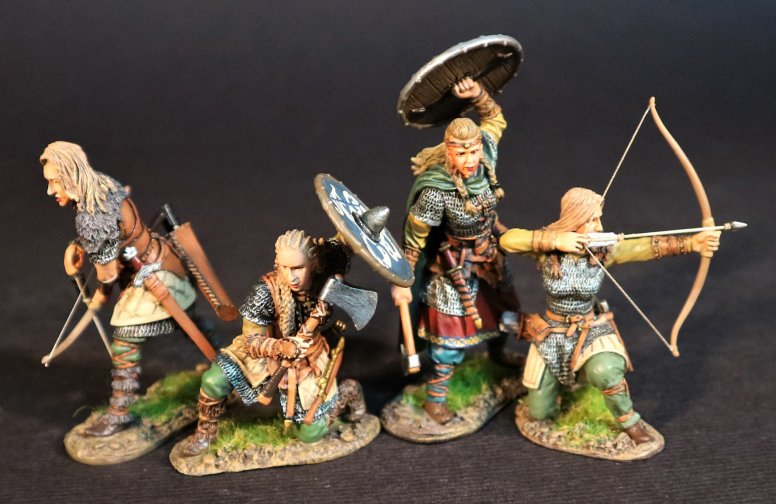
There is little actual historical evidence for Viking female warriors, although there are graves of female settlers which have contained weapons.
The historical evidence that Viking Age women took part in warfare, are based on a Byzantine historian’s records that women fought in battle when Sviatoslav I of Kiev attacked the Byzantines in Bulgaria in 971 AD.
In the Siege of Dorostolon, the Varangians suffered a devastating defeat. The victors were stunned to discover armed women among the fallen warriors.
The Saxo Grammaticus, reports that shield maidens fought on the side of Danes at the Battle of Bravellir in the year 750 AD
Examples of shield maidens mentioned by name in the Norse Sagas include Brynhildr in the Volsunga Saga.
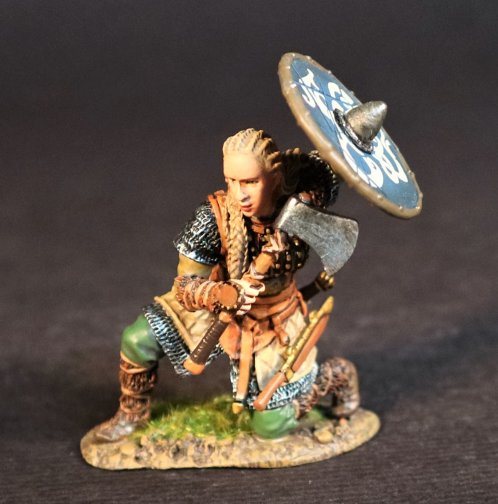
VIK-43
THE AGE OF ARTHUR,
THE VIKINGS,
VIKING SHIELD MAIDEN
Two shield maidens appear in certain translations of the Hervarar Saga.
The first of these, whose name was Hervor, was known to have taken up typically masculine roles early in her childhood and often raided travelers in the woods dressed as a man. Later in her life, she claimed the cursed sword “Tyrfing” from her father’s burial site and became a seafaring raider. She was eventually to marry and settle down.
Her granddaughter was also named Hervor and commanded forces against the attacking Huns. Although the Saga remarks on her bravery, she was mortally wounded and dies on the battlefield.
THE NORMAN ARMY
William Duke of Normandy (c. 1028-1087), usually known as William the Conqueror was the first Norman King of England, reigning from 1066 until his death in 1087.
In the 1050’s and early 1060’s, William became a contender for the throne of England held by the Childless Edward the Confessor, his first cousin removed.
There were other claimants. Including the powerful English earl Harold Godwinson, whom Edward had named as King on his deathbed, in January 1066.
William argued that Edward had previously promised the throne to him, and that Harold had sworn to support his claim.
Throughout the summer of 1066, William assembled an army and an invasion fleet in Normandy. This force included, in addition to troops from William’s own territories of Normandy and Maine, large numbers of mercenaries, allies and volunteers from Brittany, Northeast France and Flanders.
The Battle of Hastings took place on the 14[SUP]th[/SUP] October 1066. Although the numbers on each side were about equal, William had the advantage of having both cavalry, infantry and many archers.
Harold had only foot soldiers, and few archers. The English formed a shield wall along a ridge, and were initially so effective that the invading Norman army was repeatedly thrown back with heavy casualties.
Towards the end of the day some of William’s Breton troops panicked and fled, with some of the English troops pursuing the fleeing Bretons. These English troops who had broken ranks, were themselves attacked and destroyed by the Norman mounted knights.
Norman knights were armoured warriors that fought on horseback, with lance , sword and shield. These were the Norman “secret weapon” as nothing like them had been seen before in England. There were between 1,000-2,000 Norman knights in William’s army, and it was these troops which proved decisive to the invading army’s victory.
Two further Norman retreats were feigned, which once again drew the English into pursuit and expose them to repeated attacks by the Norman cavalry.
It appears that the decisive event was Harold’s death, of which there are differing versions which are told.
William of Jumieges claimed that Harold was killed by the Duke himself.
The Bayeux tapestry shows Harold’s death by an arrow to the eye.
We know that the English forces were deployed in a dense shieldwall formation at the top of a slope, (which newer sources suggests was Caldbec Hill), with their flanks protected by woods, and with marshy ground in front of them.
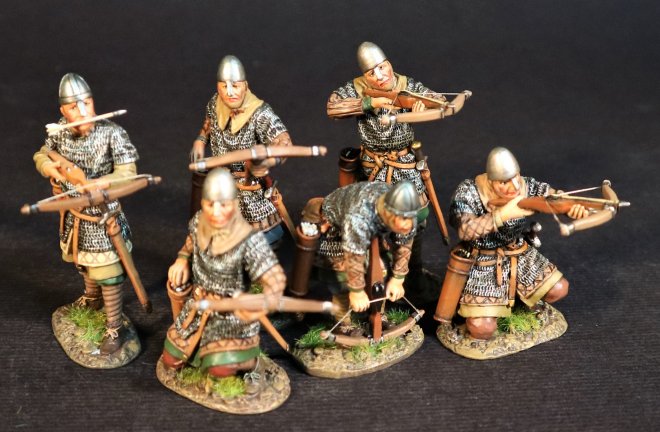
What is known about the Norman deployment, is that Duke William appears to have arranged his forces in 3 groups or “battles”. The left “battle” consisted mainly of Bretons, and was led by Alan The Red.
The Centre was held by the Normans, under direct command of the Duke, and the right was commanded by William Fitzosbern and Eustace II of Boulogne, and consisted of Frenchmen. and mercenaries from Picardy, Boulogne and Flanders.
The front lines of the invading force were made up of archers, with a secondary line of foot soldiers armed with spears and swords. The cavalry was held in reserve.
The Norman disposition of forces implies that the plan was to open the battle with archers, weakening the enemy with arrows, followed by infantry who would engage the shieldwall in close combat. The infantry would create openings in the English lines that would then be exploited by cavalry charges.
It is believed that the early barrage of arrows, probably had very little effect on the English shieldwall, due to the higher position of the English on the ridge.
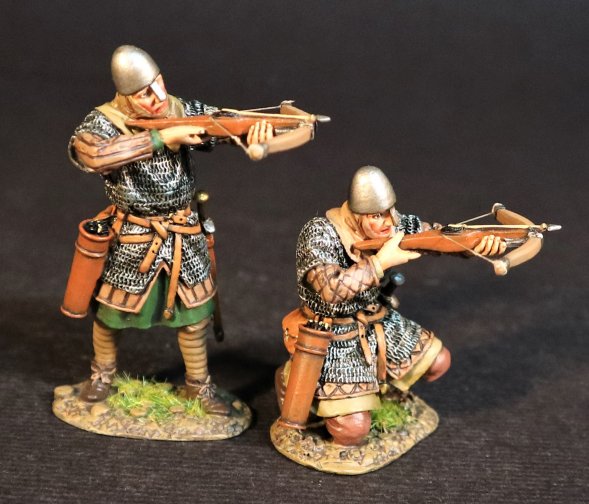
NM-38
THE AGE OF ARTHUR,
THE NORMAN ARMY,
NORMAN CROSSBOW.
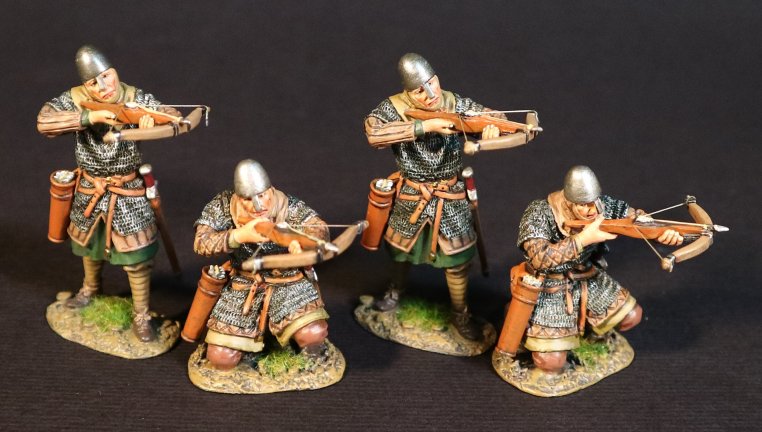
NM-38N
THE AGE OF ARTHUR,
THE NORMAN ARMY,
NORMAN CROSSBOW.
EL CID AND THE RECONQUISTA
THE SPANISH
The age in which El Cid lived has since been termed the “Reconquista”, or Christian reconquest of Spain from the Moors, and was one of the most colourful periods in military history.
The armies are spectacular and varied, ranging from the noble Christian Knights to the Muslim Andalusians, through to the religious zeal of the African invaders, the Almoravids and Almohads.
Although the period is often portrayed as a simple war of religion, it was in fact a great deal more complex, with Muslim commonly fighting Muslim, and Christian fighting Christians, with both sides using allies and mercenaries whenever it suited them.
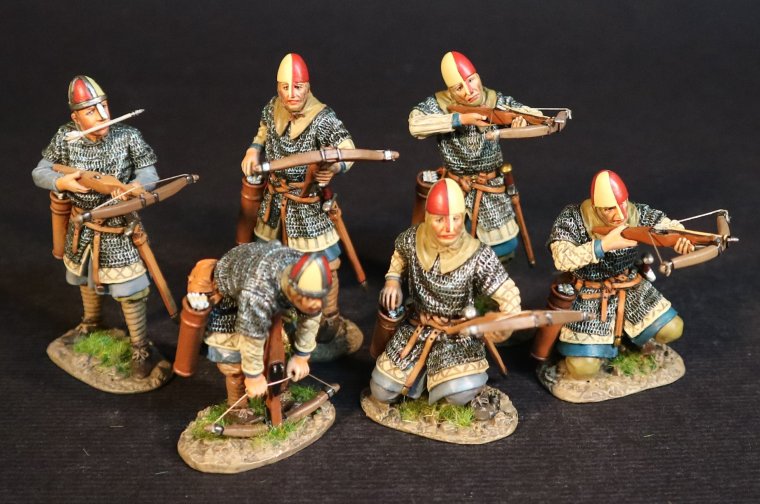
This period, during the lifetime of El Cid 1040-1100AD saw the rise of heavy cavalry charges and other northern European influences, especially in the kingdoms of Aragon and Catalonia, which had the strongest links to France.
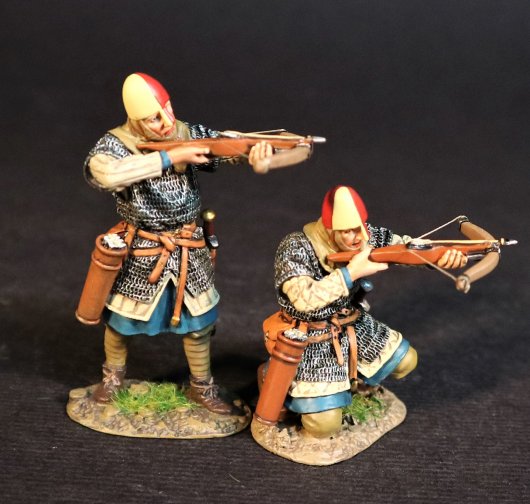
CID-18
THE CRUSADES,
EL CID AND THE RECONQUISTA,
SPANISH CROSSBOWMEN.
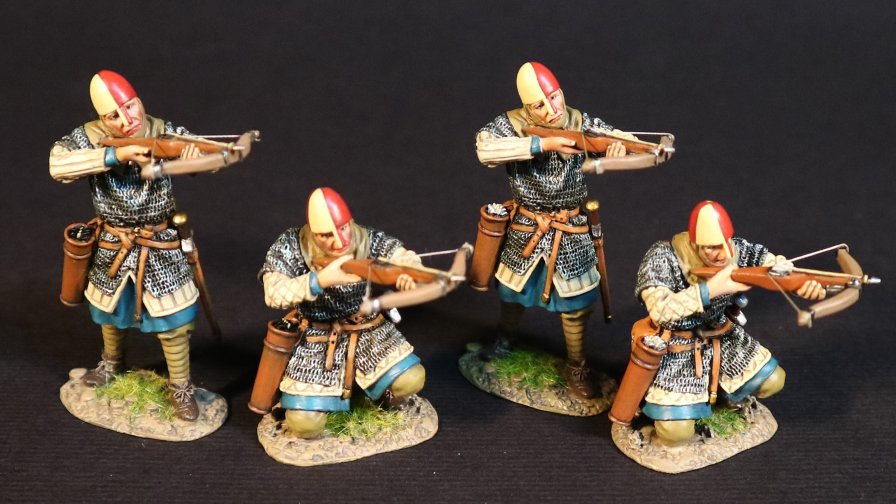
CID-18N
THE CRUSADES,
EL CID AND THE RECONQUISTA,
4 SPANISH CROSSBOWMEN
**PLEASE CONTACT YOUR LOCAL DEALER FOR FURTHER INFORMATION**
THE AGE OF ARTHUR
THE VIKINGS
VIKING SHIELD MAIDENS
A shield -Maiden was a female warrior from Scandinavian folklore and mythology.
They are often mentioned in Viking Sagas, and also in Germanic stories of the Goths, Cimbri and Marcomanni.
The mythical Valkyries may have been based on such shield maidens.

There is little actual historical evidence for Viking female warriors, although there are graves of female settlers which have contained weapons.
The historical evidence that Viking Age women took part in warfare, are based on a Byzantine historian’s records that women fought in battle when Sviatoslav I of Kiev attacked the Byzantines in Bulgaria in 971 AD.
In the Siege of Dorostolon, the Varangians suffered a devastating defeat. The victors were stunned to discover armed women among the fallen warriors.
The Saxo Grammaticus, reports that shield maidens fought on the side of Danes at the Battle of Bravellir in the year 750 AD
Examples of shield maidens mentioned by name in the Norse Sagas include Brynhildr in the Volsunga Saga.

VIK-43
THE AGE OF ARTHUR,
THE VIKINGS,
VIKING SHIELD MAIDEN
Two shield maidens appear in certain translations of the Hervarar Saga.
The first of these, whose name was Hervor, was known to have taken up typically masculine roles early in her childhood and often raided travelers in the woods dressed as a man. Later in her life, she claimed the cursed sword “Tyrfing” from her father’s burial site and became a seafaring raider. She was eventually to marry and settle down.
Her granddaughter was also named Hervor and commanded forces against the attacking Huns. Although the Saga remarks on her bravery, she was mortally wounded and dies on the battlefield.
THE NORMAN ARMY
William Duke of Normandy (c. 1028-1087), usually known as William the Conqueror was the first Norman King of England, reigning from 1066 until his death in 1087.
In the 1050’s and early 1060’s, William became a contender for the throne of England held by the Childless Edward the Confessor, his first cousin removed.
There were other claimants. Including the powerful English earl Harold Godwinson, whom Edward had named as King on his deathbed, in January 1066.
William argued that Edward had previously promised the throne to him, and that Harold had sworn to support his claim.
Throughout the summer of 1066, William assembled an army and an invasion fleet in Normandy. This force included, in addition to troops from William’s own territories of Normandy and Maine, large numbers of mercenaries, allies and volunteers from Brittany, Northeast France and Flanders.
The Battle of Hastings took place on the 14[SUP]th[/SUP] October 1066. Although the numbers on each side were about equal, William had the advantage of having both cavalry, infantry and many archers.
Harold had only foot soldiers, and few archers. The English formed a shield wall along a ridge, and were initially so effective that the invading Norman army was repeatedly thrown back with heavy casualties.
Towards the end of the day some of William’s Breton troops panicked and fled, with some of the English troops pursuing the fleeing Bretons. These English troops who had broken ranks, were themselves attacked and destroyed by the Norman mounted knights.
Norman knights were armoured warriors that fought on horseback, with lance , sword and shield. These were the Norman “secret weapon” as nothing like them had been seen before in England. There were between 1,000-2,000 Norman knights in William’s army, and it was these troops which proved decisive to the invading army’s victory.
Two further Norman retreats were feigned, which once again drew the English into pursuit and expose them to repeated attacks by the Norman cavalry.
It appears that the decisive event was Harold’s death, of which there are differing versions which are told.
William of Jumieges claimed that Harold was killed by the Duke himself.
The Bayeux tapestry shows Harold’s death by an arrow to the eye.
We know that the English forces were deployed in a dense shieldwall formation at the top of a slope, (which newer sources suggests was Caldbec Hill), with their flanks protected by woods, and with marshy ground in front of them.

What is known about the Norman deployment, is that Duke William appears to have arranged his forces in 3 groups or “battles”. The left “battle” consisted mainly of Bretons, and was led by Alan The Red.
The Centre was held by the Normans, under direct command of the Duke, and the right was commanded by William Fitzosbern and Eustace II of Boulogne, and consisted of Frenchmen. and mercenaries from Picardy, Boulogne and Flanders.
The front lines of the invading force were made up of archers, with a secondary line of foot soldiers armed with spears and swords. The cavalry was held in reserve.
The Norman disposition of forces implies that the plan was to open the battle with archers, weakening the enemy with arrows, followed by infantry who would engage the shieldwall in close combat. The infantry would create openings in the English lines that would then be exploited by cavalry charges.
It is believed that the early barrage of arrows, probably had very little effect on the English shieldwall, due to the higher position of the English on the ridge.

NM-38
THE AGE OF ARTHUR,
THE NORMAN ARMY,
NORMAN CROSSBOW.

NM-38N
THE AGE OF ARTHUR,
THE NORMAN ARMY,
NORMAN CROSSBOW.
EL CID AND THE RECONQUISTA
THE SPANISH
The age in which El Cid lived has since been termed the “Reconquista”, or Christian reconquest of Spain from the Moors, and was one of the most colourful periods in military history.
The armies are spectacular and varied, ranging from the noble Christian Knights to the Muslim Andalusians, through to the religious zeal of the African invaders, the Almoravids and Almohads.
Although the period is often portrayed as a simple war of religion, it was in fact a great deal more complex, with Muslim commonly fighting Muslim, and Christian fighting Christians, with both sides using allies and mercenaries whenever it suited them.

This period, during the lifetime of El Cid 1040-1100AD saw the rise of heavy cavalry charges and other northern European influences, especially in the kingdoms of Aragon and Catalonia, which had the strongest links to France.

CID-18
THE CRUSADES,
EL CID AND THE RECONQUISTA,
SPANISH CROSSBOWMEN.

CID-18N
THE CRUSADES,
EL CID AND THE RECONQUISTA,
4 SPANISH CROSSBOWMEN
**PLEASE CONTACT YOUR LOCAL DEALER FOR FURTHER INFORMATION**

